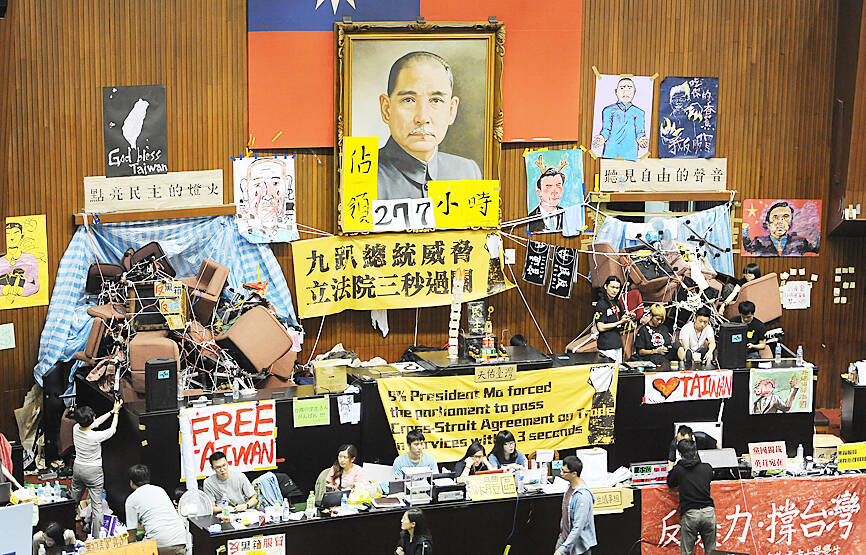A decade after the 2014 Sunflower movement, the young people who participated in the student-led demonstration have grown up, but many still carry the memories of what happened during the nearly 23-day occupation of Taiwan’s legislative chamber.
On March 18, 2014, hundreds of students and activists stormed and occupied the chamber for 22 days and 21 hours in protest a decision by the legislature, which was controlled by the Chinese Nationalist Party (KMT), to fast-track the review and approval of the cross-strait service trade agreement with China.
Protesters were concerned that increased economic integration with China would give Beijing sway over Taiwan.

Photo: Liao Chen-huei, Taipei Times
They received encouragement from the public, and hundreds of thousands of people took to the streets on March 30 in a show of their support.
The protesters peacefully left the Legislative Yuan building after then-legislative speaker Wang Jin-pyng (王金平) pledged to postpone the review of the trade pact until legislation overseeing all cross-strait agreements was passed.
The service trade deal still remains stalled in the legislature.
Meanwhile, activists from the Sunflower movement have become increasingly prominent on Taiwan’s political stage.
Taipei City Councilor Miao Po-ya (苗博雅), of the Social Democratic Party, said one of the most significant effects of the movement was an increased focus on political participation among younger people.
“In every election, the youth demographic continues to be a crucial force, because the movement was a pivotal moment in how Taiwan’s youth engaged in politics,” the 36-year-old said, adding that the voter turnout among young people had been relatively low before 2014.
Although the Sunflower movement inspired her to enter politics, she has learned the limits of what social movements can achieve, Miao said.
“Driving reform requires not only social movements, but also cooperation from the political side,” she said.
Keelung City Councilor Jiho Tiun (張之豪), of the Democratic Progressive Party, said he believes participation in the movement has given candidates like him an advantage — but just a slight one.
He ran in the 2018 and 2022 local elections and secured a seat on both occasions.
Tiun used the entertainment industry as a metaphor for politics, saying: “The Sunflower Movement was not about helping you release a solo album, it was more about getting you on a popular variety show and standing [next to the host] with a smile.”
After the Sunflower movement, the media tended to mythologize how young people had become devoted to politics, but many of those who participated are not involved in politics, Tiun added.
Hung Chun-chih (洪俊智) did not pursue a career in politics, but, like many, experienced police brutality during the protest.
Hung said he was beaten by police, and forced to disperse when they used water cannons.
“Being dispersed did not extinguish my determination to protest; it only made me more eager to support those who had also been beaten,” Hung said.
Although Hung now works at a technology company in Taipei, he always returns to his hometown in Nantou County to vote and encourages others to do so as well.
“The Sunflower movement’s biggest impact on me is that it made me care more about the development of Taiwan’s democratic society and strengthened my sense of Taiwanese identity,” he said.

POSITIVE DEVELOPMENT: Japan and the US are expected to hold in-depth discussions on Taiwan-related issues during the meeting next month, Japanese sources said The holding of a Japan-US leaders’ meeting ahead of US President Donald Trump’s visit to China is positive news for Taiwan, former Japan-Taiwan Exchange Association representative Hiroyasu Izumi said yesterday. After the Liberal Democratic Party’s landslide victory in Japan’s House of Representatives election, Japanese Prime Minister Sanae Takaichi is scheduled to visit the US next month, where she is to meet with Trump ahead of the US president’s planned visit to China from March 31 to April 2 for a meeting with Chinese President Xi Jinping (習近平). Japan and the US are expected to hold in-depth discussions on Taiwan-related issues during the

‘LIKE-MINDED PARTNER’: Tako van Popta said it would be inappropriate to delay signing the deal with Taiwan because of China, adding he would promote the issue Canadian senators have stressed Taiwan’s importance for international trade and expressed enthusiasm for ensuring the Taiwan-Canada trade cooperation framework agreement is implemented this year. Representative to Canada Harry Tseng (曾厚仁) in an interview with the Central News Agency (CNA) said he was increasingly uneasy about Ottawa’s delays in signing the agreement, especially as Ottawa has warmed toward Beijing. There are “no negotiations left. Not only [is it] initialed, we have three versions of the text ready: English, French and Mandarin,” Tseng said. “That tells you how close we are to the final signature.” Tseng said that he hoped Canadian Prime Minister Mark Carney

President William Lai (賴清德) yesterday bestowed one of Taiwan’s highest honors on Saint Vincent and the Grenadines (SVG) Ambassador Andrea Clare Bowman in recognition of her contributions to bilateral ties. “By conferring the Order of Brilliant Star with Grand Cordon on Ambassador Bowman today, I want to sincerely thank her, on behalf of the Taiwanese people, for her outstanding contribution to deepening diplomatic ties between Taiwan and SVG,” Lai said at a ceremony held at the Presidential Office in Taipei. He noted that Bowman became SVG’s first ambassador to Taiwan in 2019 and

A man walks past elementary school artworks at the Taipei Lantern Festival in Ximen District yesterday, the first day of the event. The festival is to run from 5pm to 10pm through March 15.